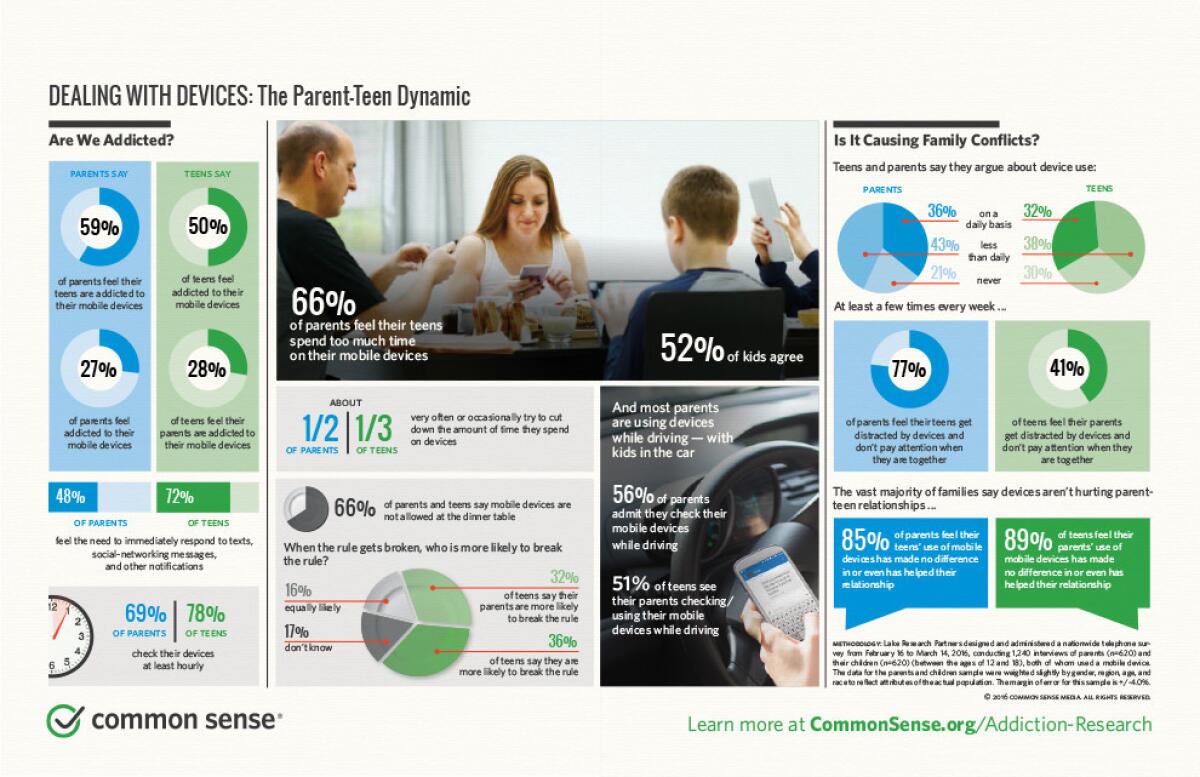Your kid might be ‘addicted’ to tech. Is that a problem?
- Share via
Quick, how many times an hour do you check your phone? Can you resist the siren call of your device?
Sure, these tools have rewired our culture in some productive ways. But the pervasive integration of technology has led many to wonder whether we might be on track to become more slave than master to these devices. Is it all really that bad?
The quick answers: perhaps and not quite.
Common Sense Media just published a report that says half of the teens it polled feel "addicted" to mobile devices, and their parents agree. This information comes months after the group published a media usage census. Common Sense also provides consumers and schools ratings, reviews and digital citizenship lesson plans.
This time, they conducted 1,240 interviews with kids across the country between 12 and 18 and parents living in the same homes. The survey reached participants by phone, and had a margin of error of plus or minus 4 percentage points. The prevailing theme was that both parent and child felt compelled to be connected – and that compulsion caused conflict.
Here are some of the highlights:

1. Distraction: Think of the last time you had a conversation of more than a minute in which your eyes and the person you were talking to actually met the whole time. Seventy-seven percent of parents in the Common Sense poll felt their kids were distracted by devices and not paying attention at least a few times a week.
If you've tried talking to any teen today -- or any person with a digital device, for that matter -- this is not a surprise. Nobody is making eye contact when screens are involved.
(Honesty break: Even as I was writing this, the many screens, tabs and apps that called to me made it very difficult to stay on task. Ask my editor.)
2. Conflict: Families are battling over use of devices. A third of both parents and teens polled say they argue about it daily.
I wonder how many of us feel just a bit hypocritical as we tell our kids "no," lifting our eyes only a brief moment from our Facebook updates, Instagram posts and tweets.
A few decades back, my mom and I sparred over the same issue that I'm just starting to tackle with my young children. The difference? The phone, computer and TV screen she was railing about were separate devices; now they are one and the same and more.
3. Risky behavior: More than half of the parents polled admitted to checking their phones while driving. And who was watching? The next generation of drivers.
We all know that texting and driving is a bad idea – downright dangerous, in fact. (And, actually, illegal in California.) But so many of us do it anyway. Why? The Common Sense Media report suggests it's because of addiction.
I think what we often call addiction is not really addiction .... We devalue it when we apply it to screen time.
— Greg Toppo, author of "The Game Believes in You: How Digital Play Can Make Our Kids Smarter"
4. But wait, is addiction the right word? "Addiction," according to the American Society of Addiction Medicine, "is characterized by inability to consistently abstain, impairment in behavioral control, craving, diminished recognition of significant problems with one's behaviors and interpersonal relationships ..."
Is our dependence on technology really that deep? "I think what we often call addiction is not really addiction," said author and education journalist Greg Toppo, noting it's a medical term. "We devalue [the gravity of the term] when we apply it to screen time."
His book, "The Game Believes in You: How Digital Play Can Make Our Kids Smarter," explores looking at gaming less as a villain and more as a potential partner in children's education. "I look at these devices just as tools," he said. An iPad is much like a hammer, in that regard.
For those of us on the grown-up end of the life spectrum, it's highly likely that our parents spoke with grave concern about our overuse of the tech of the day. As Toppo pointed out, the advent of the automobile was once seen as a strike against families. You could hop in the car and drive away from them, after all.
"Mobile devices are fundamentally changing how families go about their day-to-day life," Common Sense founder and Chief Executive James Steyer said in a statement. Families can figure out how to harness the power and possibility of these tools without becoming overpowered themselves.
In my case, call it addiction, compulsion, a heightened affinity; I recognize my phone and I have become inseparable. I have actually had a child (or two) demand that I put it down and pay attention at least once. I can easily see how, if unchecked, I could be modeling habits I will not abide in my kids.
As an unscientific experiment, I tried last night to be more aware of when and why I was reaching for my phone -- and to even see if my desire to use it outweighed my ability to just say no.
I managed to do just fine -- and I didn't even share my triumph on social media.
Before you put away your device, share how you use it effectively with kids at @mmaltaisla
Sign up for Essential California
The most important California stories and recommendations in your inbox every morning.
You may occasionally receive promotional content from the Los Angeles Times.








